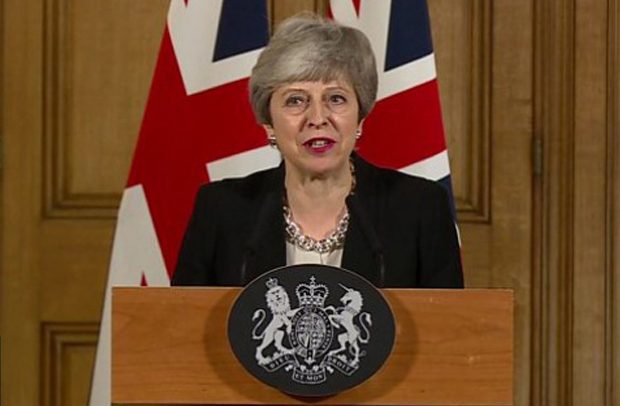Theresa May: “I’m offering to sit down with the leader of the opposition”
Theresa May will ask the EU for an extension to the Brexit deadline to “break the logjam” in Parliament.
The PM says she wants to meet Labour leader Jeremy Corbyn to agree a plan on the future relationship with the EU.
But she insisted her withdrawal agreement – which was voted down last week – would remain part of the deal.
Mrs May said she wanted the extension to be “as short as possible” – before 22 May so the UK does not have to take part in European elections.
The UK has until 12 April to propose a plan – which must be accepted by the EU – or it will leave without a deal.
The UK was supposed to leave the EU on 29 March, but Mrs May agreed a short extension after realising Parliament would not agree a deal by the deadline.
MPs have twice held indicative votes to try to find a consensus, but none of the proposals won a majority.
Mrs May met her cabinet for more than seven hours on Tuesday, and afterwards gave a statement from Downing Street.
She said she wanted to agree a new plan with Mr Corbyn and put it to a vote in the Commons before 10 April – when the EU will hold an emergency summit on Brexit.
If she and Mr Corbyn do not agree a single way forward, she proposed putting a number of options to MPs “to determine which course to pursue”.
The PM said she understood some people were “so fed up with delay and endless arguments” they would prefer to leave without a deal, and she believed the UK “could make a success of no-deal in the long term”.
But she added that leaving with a deal was “the best solution”.
“This is a difficult time for everyone,” said Mrs May. “Passions are running high on all sides of the argument, but we can and must find the compromises that will deliver what the British people voted for.
“This is a decisive moment in the story of these islands and it requires national unity to deliver the national interest.”
How has Brexit unfolded?
November 2018: UK agrees withdrawal agreement and framework of future relations with EU
December 2018: Theresa May postpones first meaningful vote on deal to seek further assurances from EU
15 January: House of Commons rejects overall Brexit deal by 230 votes
13 March: MPs vote down Brexit deal for second time by 149 votes
22 March: EU agrees to delay Brexit beyond 29 March – but only to 12 April if UK can’t agree deal within a week
29 March: MPs reject withdrawal agreement on its own by 58 votes
2 April: PM says she will seek further “short extension” from the EU
Hilary Benn, the Labour MP who chairs the Commons Brexit committee, said the PM’s decision to apply for a further extension from the EU was “good news”.
“I welcome the fact that the PM has finally acknowledged she cannot take the UK out of the EU next Friday with no deal,” he told the BBC.
But he said Mrs May needed to show she was genuinely open to new ideas.
“She really needs to give Parliament an indication she is willing to move. If this is the first indication she will shift, that is important but if it is the same old story then it isn’t.”
But Brexit-supporting Labour MP Kate Hoey said “whatever compromise” Theresa May and Jeremy Corbyn came up with, many MPs would simply not vote for the withdrawal agreement.
“I still feel there is an opportunity for what people actually voted for,” she told the BBC’s Beyond 100 Days programme.
“They voted to leave. It is really quite simple. It is just so many MPs don’t want us to leave and have stopped us trying to do so.”
After Mrs May’s statement, the president of the European Council, Donald Tusk, called for patience.
Even if, after today, we don’t know what the end result will be, let us be patient. #Brexit
— Donald Tusk (@eucopresident) April 2, 2019
Source BBC


